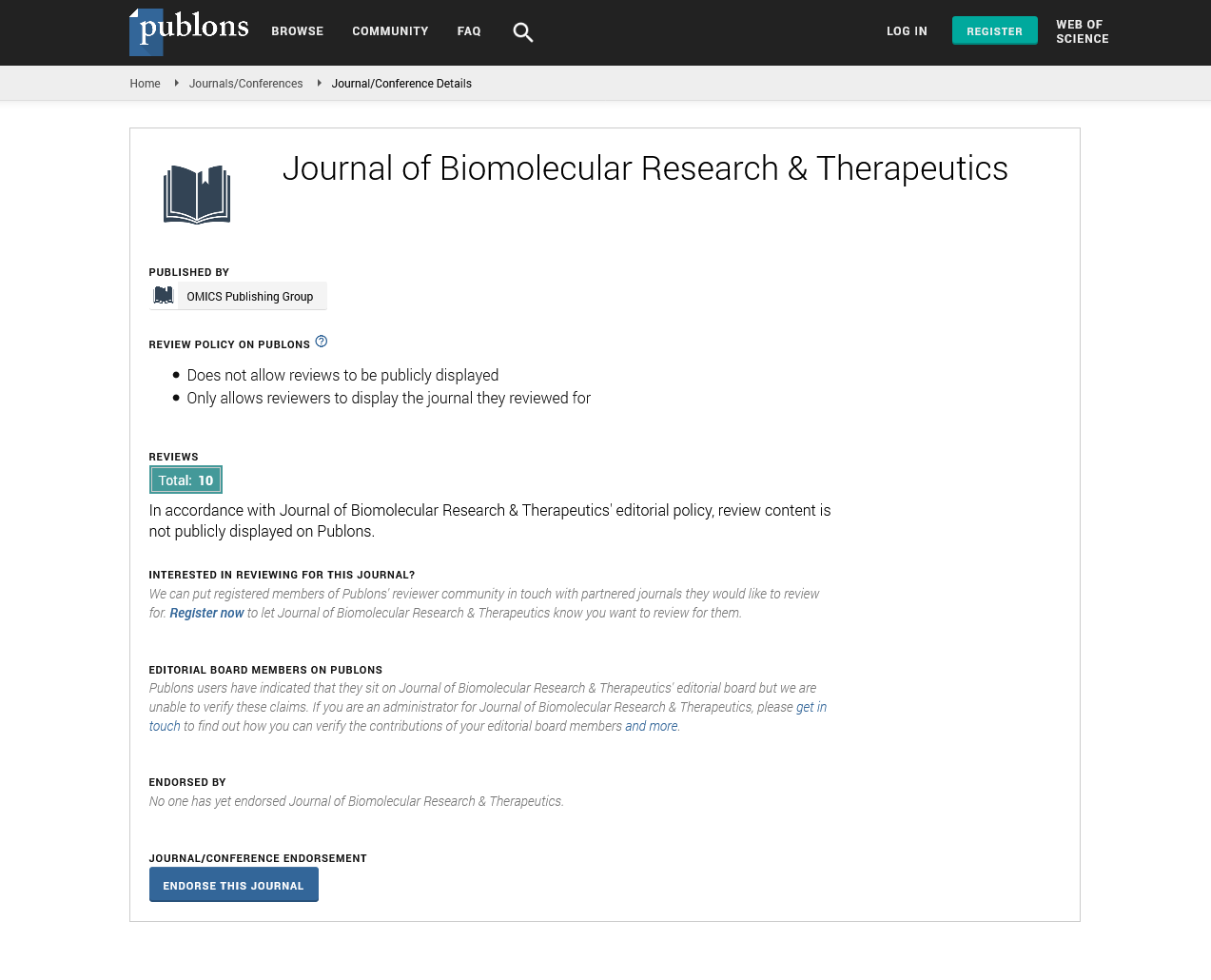Indexed In
- Open J Gate
- Genamics JournalSeek
- ResearchBible
- Electronic Journals Library
- RefSeek
- Hamdard University
- EBSCO A-Z
- OCLC- WorldCat
- SWB online catalog
- Virtual Library of Biology (vifabio)
- Publons
- Euro Pub
- Google Scholar
Useful Links
Share This Page
Journal Flyer

Open Access Journals
- Agri and Aquaculture
- Biochemistry
- Bioinformatics & Systems Biology
- Business & Management
- Chemistry
- Clinical Sciences
- Engineering
- Food & Nutrition
- General Science
- Genetics & Molecular Biology
- Immunology & Microbiology
- Medical Sciences
- Neuroscience & Psychology
- Nursing & Health Care
- Pharmaceutical Sciences
Perspective - (2025) Volume 14, Issue 1
HighâThroughput Screening of Natural Product Libraries Identifies Mitochondrial HSP90 Inhibitors for Neurodegenerative Disease
Sarah Martinez*Received: 27-Jan-2025, Manuscript No. BOM-25-29382; Editor assigned: 29-Jan-2025, Pre QC No. BOM-25-29382; Reviewed: 12-Feb-2025, QC No. BOM-25-29382; Revised: 18-Feb-2025, Manuscript No. BOM-25-29382; Published: 26-Feb-2025, DOI: 10.35248/2167-7956.25.14.425
Description
Neurodegenerative diseases, including Alzheimer's disease, Parkinson's disease, Huntington's disease and Amyotrophic Lateral Sclerosis (ALS), are characterized by progressive neuronal loss and cellular dysfunction, often linked to mitochondrial impairment, protein misfolding and oxidative stress. Mitochondrial health is critical for neuronal survival and function, given the high energy demands of brain tissue. Within mitochondria, the molecular chaperone HSP90 (Heat Shock Protein 90) plays a pivotal role in maintaining protein homeostasis, aiding in the folding of mitochondrial proteins and stabilizing client proteins involved in cellular signaling pathways.
However, under pathological conditions, mitochondrial HSP90 becomes dysregulated, promoting the survival of damaged cells, disrupting mitochondrial dynamics and contributing to the persistence of dysfunctional neurons. Therefore, targeting mitochondrial HSP90 with specific inhibitors has emerged as a novel therapeutic strategy for mitigating the progression of neurodegenerative diseases. Natural products have long been a rich source of pharmacologically active compounds due to their diverse chemical structures and biological activities. In recent years, advancements in High-Throughput Screening (HTS) technologies have made it feasible to screen extensive natural product libraries to identify bioactive molecules with precise molecular targets. This approach enables rapid and efficient discovery of potential drug candidates by evaluating thousands of compounds for their ability to interact with specific proteins or cellular processes. In the context of neurodegenerative diseases, HTS of natural product libraries has become an invaluable tool for identifying inhibitors of mitochondrial HSP90, offering new leads for drug development.
The study of mitochondrial HSP90 inhibitors through HTS begins with the design of a robust and sensitive assay capable of detecting HSP90 inhibition within mitochondrial compartments. This typically involves cell-based assays, thermal shift assays, or biochemical assays that measure the ATPase activity of HSP90, a key indicator of its chaperone function. Libraries composed of purified natural products, plant extracts, or marine-derived compounds are screened for their ability to suppress HSP90 activity selectively within mitochondria without disrupting its cytosolic functions. Hits identified from the primary screen are further validated through secondary assays, including dose–response evaluations, cellular viability studies and assessments of mitochondrial function such as membrane potential, Reactive Oxygen Species (ROS) production and ATP synthesis.
Several natural compounds identified through such screening efforts have shown promise in modulating mitochondrial function and reducing neurodegenerative pathology. For instance, compounds derived from flavonoids, alkaloids and terpenoids have demonstrated the capacity to inhibit mitochondrial HSP90, restore mitochondrial dynamics and reduce oxidative damage in neuronal cells. These compounds often exhibit multi-target activities, such as modulating autophagy, inhibiting inflammation, or reducing protein aggregation factors commonly associated with neurodegeneration. A key advantage of using natural products lies in their evolutionary optimization for biological interaction, often resulting in better bioavailability and lower toxicity profiles compared to synthetic molecules.
Importantly, mitochondrial-selective HSP90 inhibition differs from global HSP90 blockade, which can lead to significant toxicity due to disruption of essential chaperone functions throughout the cell. Targeted inhibition ensures that only the disease-relevant mitochondrial pathways are modulated, thereby improving therapeutic precision and safety. Natural product-derived inhibitors can also be chemically modified to enhance their specificity for the mitochondrial isoform of HSP90, known as TRAP1 (Tumor Necrosis Factor Receptor-associated Protein 1), which has been implicated in mitochondrial protein folding, oxidative phosphorylation and cellular stress responses in neurons. By inhibiting TRAP1 selectively, researchers can promote the clearance of dysfunctional mitochondria through mitophagy and restore energy balance in neurons affected by chronic neurodegenerative conditions.
While early-stage results are promising, several challenges must be addressed to move these discoveries toward clinical applications. These include improving the pharmacokinetic properties of lead compounds, ensuring their ability to cross the blood–brain barrier and confirming their long-term safety and efficacy in preclinical models. Moreover, understanding the broader network of interactions affected by HSP90 inhibition in neuronal cells is essential to prevent unintended consequences, such as compensatory stress responses or off-target toxicity. Advanced tools such as transcriptomics, proteomics and metabolomics can be employed to map the cellular impact of candidate inhibitors and guide the optimization process.
In conclusion, high-throughput screening of natural product libraries represents a powerful and efficient approach for discovering novel mitochondrial HSP90 inhibitors with potential applications in the treatment of neurodegenerative diseases. By combining the chemical richness of natural compounds with modern screening and validation technologies, researchers are uncovering new therapeutic pathways to address the complex mechanisms underlying neuronal degeneration. These efforts not only advance our understanding of mitochondrial biology but also open new avenues for the development of safe, targeted therapies that could delay or halt the progression of devastating neurodegenerative disorders.
Citation: Martinez S (2025) High?Throughput Screening of Natural Product Libraries Identifies Mitochondrial HSP90 Inhibitors for Neurodegenerative Disease. J Biol Res Ther. 14:425.
Copyright: © 2025 Martinez S. This is an open access article distributed under the terms of the Creative Commons Attribution License, which permits unrestricted use, distribution AND reproduction in any medium, provided the original author and source are credited.

